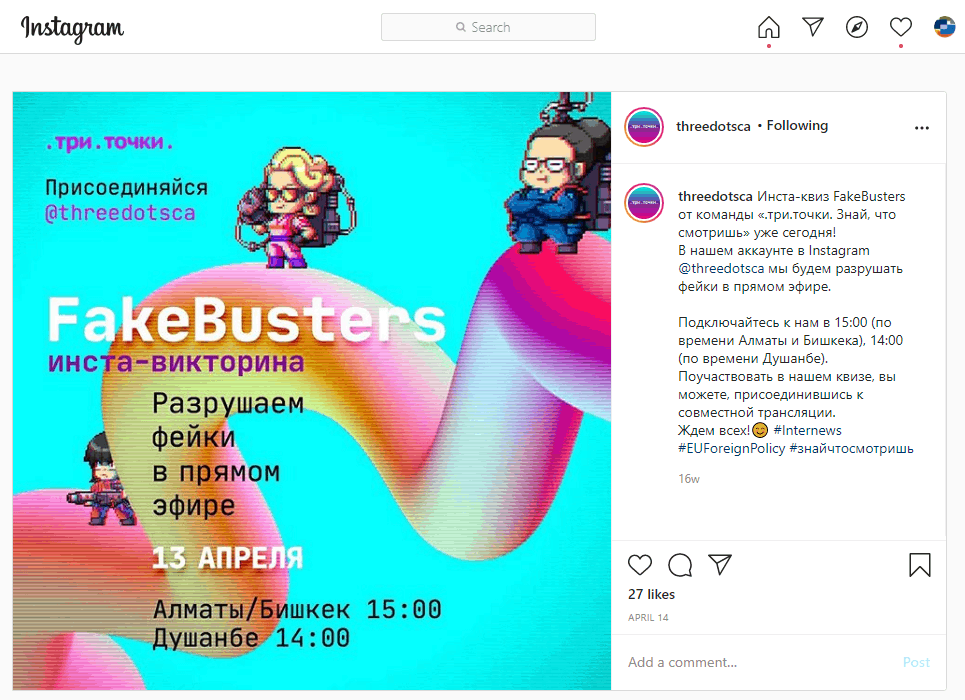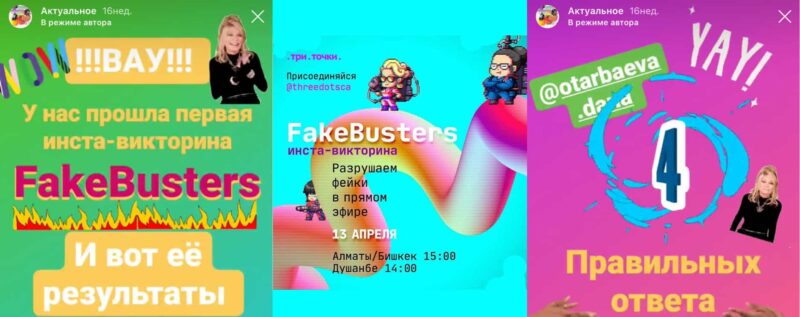In Central Asia, Internews launched “Fake Busters,” a series of weekly educational and interactive Instagram quizzes to help ordinary citizens, including children, identify fake information and news related to the COVID-19 virus.
The team posted an initial 12 Instagram quizzes that engaged hundreds of people. Several were targeted at young people, designed to help them improve critical thinking and informed web browsing. The project evolved, moving quizzes to Instagram stories, and the most recent 16 quizzes have been attended by 2,800 people.
How the Quiz Works
 The Insta-Quiz FakeBusters team announces the new quiz on Instagram – “Three dots. Know What You Are Watching” – inviting people to join them online to take part in the quiz. Viewers then join a livestream, and answer questions in real time, posed by the host.
The Insta-Quiz FakeBusters team announces the new quiz on Instagram – “Three dots. Know What You Are Watching” – inviting people to join them online to take part in the quiz. Viewers then join a livestream, and answer questions in real time, posed by the host.
The host asks participants to answer “true” or “false” to questions like these:
- In Russia, a newborn was named “Covid” after the coronavirus (False, although newborns have been named “Covid” in India and the Philippines)
- The media reported that two cats were infected by the coronavirus (True)
- A Russian priest-virologist called coronavirus God’s punishment (True)
See a video (in Russian) of one of the streaming quizzes:
Parents Find Quizzes Helpful for their Children Learning from Home
Sabina, a mother from Kyrgyzstan whose daughter Dayana took one of the recent quizzes, praised the initiative as a “big help for us [parents] who are stuck at home with kids and don’t know how to explain to them what fakes and misinformation are…these quizzes are fun to play and very informative.”
Watch a video of Dayana participating in a quiz designed for children:
What the Fact Provides Accurate Information about COVID-19
Another anti-fake initiative launched by the Internews team is “What the Fact,” a video livecast. Doctors, theologists, economists, lawyers, psychologists, and government representatives are invited to the online discussion to expose COVID-19 fakes and disinformation. The videos are streamed on Facebook and anyone can ask question or interact with invited guests in real time. One “What the Fact” episode featured prominent lawyers from Kazakhstan, Kyrgyzstan and Tajikistan discussing if government responses were effective in preventing the spread of disinformation around COVID-19, as well as the implications regarding freedom of expression
These media literacy activities are funded by the European Union and implemented by Internews in Central Asia.
